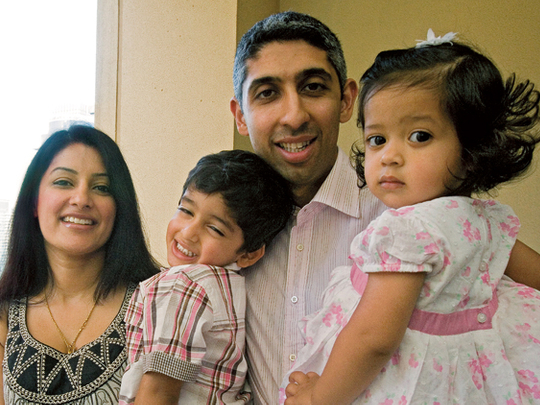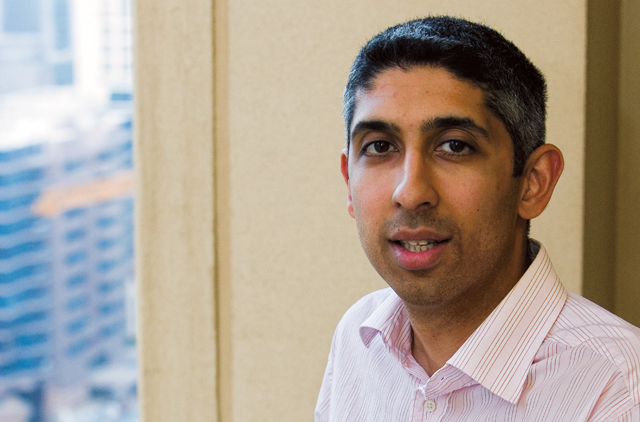
The voice therapist gave me his number and said it was OK to speak to him. But I hesitated a bit, wondering if it was such a good idea to call someone who was having trouble with his voice and ask him how his therapy was progressing. Eventually, I decided to make the call. A few moments later, a voice greeted me on the other end of the line. "Can I speak to Randeep Sangha?" I said, still a little unsure about what I was doing. "This is Randeep speaking," said the man. I was pleasantly surprised. There had been a time when Sangha's words literally choked in his throat. Now his voice was quite clear though a tad tinny.
Dubai-based Indian expat Randeep Sangha was diagnosed with lung cancer in September 2010. To prevent the disease from spreading further, the doctors at the American Hospital Dubai had to remove his left lung and the main left vocal nerve. For weeks after the surgery, his voice was a mere whisper. His words often mistaken for a sigh.
"The impact on my voice did not come across as a worry to me then," says Sangha, recounting his ordeal in a telephone interview from the UK where he had gone to undergo specialist chemotherapy for his condition.
"It was a major procedure I had undergone and as a result I was weak and tired most of the time. But as I gained strength and tried to resume my old way of living, I realised that something was missing - my voice. I wasn't able to speak louder than a whisper, could not talk over the phone and could barely be heard if I was outdoors. I could not communicate with my kids. I felt singled out and deprived. It was stressful."
While it was definitely worrisome, Sangha was not overly upset because he had been assured by his doctor that voice therapy would help.
Learning to speak again
Things started to improve after Sangha began voice therapy with Lee Bolton, speech therapy specialist at the American Hospital Dubai. He learnt to strengthen his remaining vocal muscles and nerves so he could use them to produce normal speech and sound. Training involved diaphragm breathing exercises and voice modulation (monitoring/strengthening) techniques. "The voice box has muscles and nerves on the left and right sides of the throat,'' explains Sangha. "It is natural for a person to use muscles on both sides when speaking. After my left voice nerve was removed my voice became suppressed as it was dependant on the right side only.
"During the therapy sessions, I had to learn to speak all over again. When you lose your voice, there is so much silence that envelops you that you feel alone and lost. It's amazing how we don't appreciate the things we have until [we lose them]," he says.
Slowly, as he learnt to speak and was able to communicate with his kids again, Sangha's spirits began to soar. "It's a blessing to be heard. For a while, my kids got away with their mischief but now I can shout at them," he laughs.
Understand your voice
The human voice is much like a fingerprint - no two voices are exactly the same. But unlike a fingerprint, voices can also reveal much more information about a person - age, gender, mood, emotional state and general health. We use and rely on our voices to communicate, interact and work, yet we take them for granted. It's only when a problem develops with the voice that we realise how important it is.
"Many people are unaware of the complications that can arise when the voice fails. If not treated in time, it could lead to chronic problems," cautions Bolton. "Almost everyone experiences a voice problem at some time in their life. Thankfully, they are often temporary."
Temporary loss of voice, says Bolton, can happen due to a common cold or flu, or vocal fatigue experienced after a long period of talking, prolonged shouting or yelling. Talking too loudly and for too long, over loud background noise of a restaurant or club can also lead to voice problems temporarily. These problems may become chronic if the voice continues to be misused, overused or abused (damaged) when it is weak.
"The risk of voice damage," says Bolton, "increases particularly if the patient suffers from an upper respiratory tract infection when he forces his voice to sound normal without giving it time to rest and recover."
It is important to prevent vocally abusive behaviour that can lead to permanent voice damage.
"When a person's voice changes or is affected by a debilitating condition, the most common complaints are loss of vocal projection, vocal fatigue/tiredness, croaky or hoarse-sounding tone, and the inability to be heard over background noise.
"Fortunately, these problems can be lessened and often reversed with healthy vocal habits, good vocal hygiene and correct voice use. The majority of voice changes are related to specific causes that can usually be treated by either voice therapy alone or in conjunction with medical or surgical procedures," says Bolton.
Who is at risk?
Some people can be more susceptible to voice problems than others for a host of reasons including physical, biological, emotional, psychological and occupational. Some people recover from voice problems relatively quickly, while others may take longer, or actually get worse with time. Many voice problems do not usually have a single cause, but are the result of multiple factors (physical, psychological, emotional, environmental, personal response/coping) that occur in combination at any given time.
Occupational voice users such as singers, actors, television and radio presenters, teachers, aerobics instructors, telephone operators and salespeople are particularly at risk for developing voice problems. Other professionals who also rely heavily on their voices like nurses, doctors, lawyers and politicians are at risk. A person may not know that they are an occupational voice user until a problem occurs.
"We need to be aware that vocally demanding occupations place people at greater risk for developing voice problems, and that we all have a responsibility to listen to our voices so that we can recognise early on when we are developing problems. Nobody should accept hoarseness as part of their job or life," says Bolton.
Medical conditions that can affect the voice:
- Acute viral infections, such as laryngitis or upper respiratory infections.
- Vocal fatigue, where the voice sounds tired or fades with use, lacks volume and energy. It may also be associated with aching and soreness.
- Benign lesions on the vocal cords, such as vocal nodules, polyps and cysts.
- Vocal cord palsy (similar to Bell's palsy in the face, but affecting the nerves that control the voice rather than the facial nerve and muscles. It can also occur after head, neck or chest surgery, and in some neurological conditions).
- Certain neurological conditions can also affect the voice, such as Parkinson's Disease and stroke. They may be improved with voice therapy.
- Irritants, such as smoking, environmental allergies and acid reflux.
- Stress and emotional or psychological distress.
- Normal age-related changes that affect the muscles, including the laryngeal muscles and therefore the voice. These may be reversed or improved with voice therapy.
- Laryngeal cancer, most often requiring a combination of surgery, radiotherapy, chemotherapy and voice therapy.
How to maintain good vocal health
Use your voice sensibly. Monitor your habits to keep vocal stress at a minimum.
Set aside time for relaxation every day; 20 to 30 minutes "quiet time" to rest and relax your voice box muscles, especially if you've been using your voice for a long time, if it sounds hoarse or if your muscles feel tired or sore.
Try holding your nose and breathing through your mouth. You should feel cool air slide over the back of your tongue if your throat is open. If your breath feels shallow it means that the root of your tongue is probably blocking the air. Relax and try again.
Warm-up your voice with gentle exercises like humming, blowing through a straw and making sounds at different pitches, controlling breath and modulating it if you're going to be speaking loudly to a big crowd for a long time.
Limit your daily intake of coffee, tea and energy drinks as these tend to dehydrate rather than hydrate. Drink a glass of water after every caffeinated drink.
Some medications can have a drying effect on your voice. Antihistamines reduce saliva to dry out the mucus and this can dehydrate the vocal cords. Drink plenty of fluids when you are on such prescriptions.
Stop smoking. Smoking is the single worst thing you can do for your voice. The heat and chemicals in tobacco cause dehydration, irritation, inflammation and may cause permanent changes to the vocal folds. Smoking is the leading cause of laryngeal (voice box) cancer.
Avoid coughing harshly or frequent throat clearing as this involves slamming the vocal folds together forcefully. Sip water, swallow, chew gum or suck on a sweet instead.
Continuing to talk normally when you have an infection can lead to long-term voice problems. Avoid misusing or abusing the voice.
The simple message is "listen to your voice" - it may be trying to tell you something. If you experience a change in the usual sound of your voice (hoarseness) that lasts two to three weeks or does not get better after antibiotics, it may signal a voice problem and mean that you need to see an ENT specialist, says Bolton.
Fact
- Drinking about two litres of water a day in hot weather is good for your voice.
- Inhale steam for five minutes to hydrate and soothe the vocal folds.
Information courtesy: Lee Bolton of AHD
Ruqya Khan is a Sharjah-based freelancer












